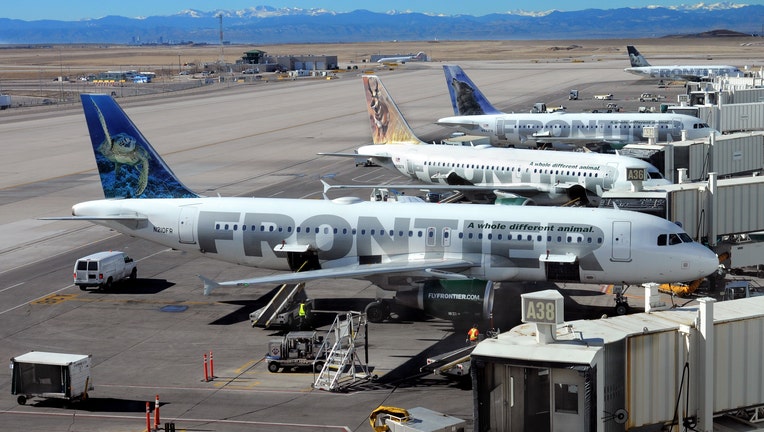Frontier Airlines launches coronavirus ‘More Room’ seat option

Frontier Airlines planes are loaded and serviced at the gates at Denver International Airport in Denver, Colorado. (File photo by Robert Alexander/Getty Images)
Frontier Airlines will allow its customers to social distance on its planes for a price.
The budget airline is offering a “More Room” seat option that costs at least $39 more per passenger, one way. Booking the selection ensures the middle seat that is next to a passenger will be empty for the duration of the flight.
This new seating option comes days after Frontier Airlines announced it is making face coverings mandatory during the coronavirus pandemic.
“While we believe the best measure to keep everyone healthy is to require face coverings, for those who want an empty seat next to them for extra peace of mind or simply additional comfort, we are now offering ‘More Room,’” said Frontier CEO Barry Biffle in a statement Monday.
Eighteen “More Room” seats will be available on flights departing May 8 through Aug. 31. Passengers can also choose this special seating option for stretch seats in the first three rows of the aircraft – which provide extra legroom and reclining space.
VIDEO: Frontier Airlines charging extra for 'more room' seats amid coronavirus
Frontier will announce whether its “More Room” program will be extended beyond Aug. 31 at a later date if the coronavirus persists.
Face coverings will be a requirement starting May 8 for passengers who are visiting the airline’s ticket counters and gate areas in addition to onboard.
Related Coverage
American, Delta and other major US airlines to require passengers to wear face masks
JetBlue to require customers to wear face coverings
Hotels beef up cleaning standards to calm travelers
Symptoms for coronavirus COVID-19 include fever, coughing, and shortness of breath. These, of course, are similar to the common cold and flu.
Expect a common cold to start out with a sore or scratchy throat, cough, runny and/or stuffy nose. Flu symptoms are more intense and usually come on suddenly, and can include a high fever.
Symptoms of COVID-19 may appear more slowly. They usually include fever, a dry cough and noticeable shortness of breath, according to the World Health Organization. A minority of cases develop pneumonia, and the disease is especially worrisome for the elderly and those with other medical problems such as high blood pressure, obesity, diabetes or heart conditions.
RELATED: Is it the flu, a cold or COVID-19? Different viruses present similar symptoms
Right now there's one big difference between flu and coronavirus: A vaccine exists to help prevent the flu and it's not too late to get it. It won't protect you from catching the coronavirus, but may put you in a better position to fight it.
To protect yourself, wash your hands well and often, keep them away from your face, and avoid crowds and standing close to people.
And if you do find yourself showing any of these flu or coronavirus symptoms - don't go straight to your doctor's office. That just risks making more people sick, officials urge. Call ahead, and ask if you need to be seen and where.

